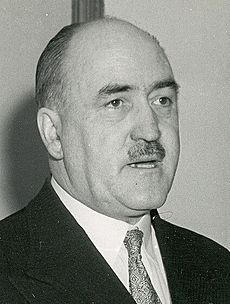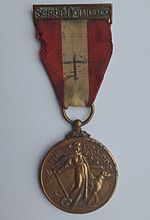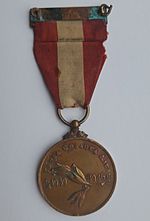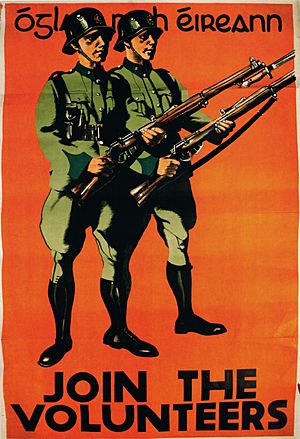The Emergency (Ireland) facts for kids
The Emergency (Irish: Ré na Práinne / An Éigeandáil) was a special time in Ireland during World War II. Even though the war was happening, Ireland decided to stay neutral. This means they did not pick a side.
The Irish parliament, called Dáil Éireann, announced this special time on 2 September 1939. This allowed them to pass a law called the Emergency Powers Act 1939. This law gave the government many new powers. They could hold people without trial, control what was printed in newspapers and sent in letters, and manage the country's money and supplies.
The special powers ended on 2 September 1946. However, "The Emergency" was not officially over until 1976.
Contents
Why Ireland Declared The Emergency
After the War of Independence, Ireland became a self-governing country called the Irish Free State in 1922. Six counties in the north, known as Northern Ireland, chose to stay part of the United Kingdom. This led to a difficult Irish Civil War in Ireland.
Later, in 1937, Éamon de Valera became the leader of Ireland. He introduced a new constitution that made Ireland even more separate from the United Kingdom. He also got back control of important naval bases, called Treaty Ports, from Britain.
However, there was still a group called the IRA that did not agree with how Ireland was set up. They believed they were the real government. From 1939, this group carried out bombings and attacks in England.
Starting The Emergency

When Germany invaded Poland in September 1939, World War II began. On 2 September, Éamon de Valera told the Dáil Éireann that staying neutral was the best choice for Ireland. Most people in Ireland agreed with this.
The government then passed the Emergency Powers Act 1939. This law allowed them to control news and mail. They also took control of the country's economy. Seán Lemass was in charge of supplies.
The government used these powers a lot. They held members of the IRA in special camps. Frank Aiken was in charge of censorship. This was to stop news that might harm Ireland's neutrality. It also prevented Ireland from becoming a place for foreign spies.
Ireland's Neutrality Policy
Ireland's government wanted to show it was not taking sides. This meant telling everyone about military actions, like seeing submarines or parachutes. It also meant stopping any foreign spying.
Because of where Ireland is located, its neutrality often helped the Allies (like Britain and the US) more than Germany. For example, British pilots who crashed in Ireland could go free if they were not on a combat mission. Many of them then went to Great Britain through Northern Ireland. Also, British mechanics could fix Allied planes that crashed.
Irish and British intelligence services worked together a lot. They shared information, like detailed weather reports from the Atlantic Ocean. A weather report from Blacksod Bay, County Mayo, even helped decide when the D-day landings would happen.
However, in the first years of the war, Ireland did not openly favor either side. This was partly because de Valera wanted to keep the country united. Many Irish people did not like Britain, and some even admired Germany.
The IRA During The Emergency
In the early days of The Emergency, the IRA was a big threat to Ireland. In 1939, they stole a lot of ammunition from the Irish Army. There were also killings, mostly of police officers.
The government passed new laws, the Offences Against the State Acts, in 1939 and 1940. These laws created a special court, the Special Criminal Court. They also allowed the government to arrest and hold IRA members again.
Some IRA members died during hunger strikes in prison. Two IRA men were executed in 1940 for killing policemen. The government's strong actions, like holding people without trial and using executions, made the IRA much weaker.
By 1941, the IRA's hopes of a German invasion had faded. Money from the United States also stopped. Most IRA leaders were held in the Curragh Camp. The IRA tried to work with German intelligence, but these efforts did not achieve much.
Ireland and the United Kingdom
Britain found it hard to accept Ireland's neutrality. Winston Churchill, the British Prime Minister, felt that Ireland should support Britain in the war. He said that Ireland was "skulking" (hiding away).
After France fell to Germany in 1940, the war came very close to Ireland. Britain worried that Germany might invade Ireland. They thought the Irish Army was not strong enough to stop an invasion. Britain wanted to put its own troops and ships in Ireland to help.
The Irish government believed they could defend themselves. They also said they would not agree to joint military actions as long as Ireland remained divided (with Northern Ireland being part of the UK).
Offer of Irish Unity Refused
In June 1940, Britain offered to work towards a united Ireland if Ireland joined the Allies. They also offered military equipment. In return, Ireland would have to join the war and hold all German and Italian citizens.
De Valera refused this offer. One reason was that he thought Britain might lose the war. He did not want Ireland to be on the losing side.
Ports and Shipping
Most of Ireland's trade was with the United Kingdom, and most of its supplies came from there. This became very difficult because Germany tried to block supplies to Britain.
Britain also wanted to use Irish ports and air bases in western Ireland to protect shipping from German U-boat attacks. Churchill complained that not being able to use these ports was a "heavy and grievous burden."
The Irish government saw this as a threat of invasion. Relations between the two countries got worse in late 1940 and early 1941. Britain even started to limit trade with Ireland. Relations only improved in mid-1941 when Germany invaded the Soviet Union. Also, Ireland allowed its citizens to go to Britain to work in war industries.
The Economy During The Emergency
Ireland's economy faced many challenges. Since it depended on Britain for coal, goods, and fuel, supplies were cut after France fell. This caused prices to go up and a busy black market (where things were bought and sold illegally).
Food supplies, like wheat, also went down. There were fears of famine. The British press attaché in Dublin reported, "No coal. No petrol. No gas. No electric. No paraffin. Guinness good." This shows how tough life was.
Britain eventually agreed to supply wheat and coal to Ireland. In return, Ireland allowed beer to be exported to Britain. These deals helped Ireland stay neutral during the war.
Ireland and the United States
When World War II started, the United States was also neutral. President Franklin D. Roosevelt supported Britain, but US laws limited what he could do.
Ireland wanted the US to sell them weapons. The US, however, sold most of its extra weapons to Britain and Canada.
De Valera tried to influence US opinion to support Ireland's neutrality. He even sent Frank Aiken to Washington in 1941 to ask for arms. But Aiken's visit did not go well. He was very anti-British, which did not help with the US government. As a result, the US did not sell any weapons to Ireland. Relations between the two countries got worse.
Important Events During The Emergency
Belfast Bombing Raids
Northern Ireland was part of the United Kingdom and was at war. The shipyards in Belfast were important targets for German bombers. On 15 April 1941, German planes attacked Belfast. Over 1,000 people died, and many houses were destroyed.
Northern Ireland's Minister of Commerce asked de Valera for help. Within two hours, fire trucks from Dublin and other Irish towns crossed the border to help their colleagues in Belfast. De Valera later gave a famous speech saying, "they are our people."
Dublin Bombing
On 30/31 May 1941, German planes bombed Dublin. Thirty-eight people were killed, and many houses were destroyed. Unlike earlier small bombings, everyone knew it was the German air force.
The Irish government protested, and Germany apologized. They claimed strong winds or British interference with navigation signals were to blame. Churchill later suggested that British technology might have made the German planes go off course. Dublin did not have strict blackout rules, so the city was easy to see at night.
Germany later offered to pay for the damage, but only West Germany paid after the war.
Allies and Neutrality
- In June 1940, Churchill offered to work for a united Ireland if Ireland joined the Allies. De Valera refused.
- When the Irish police found German spy plans in 1941, they quickly shared them with British intelligence.
- Irish and British military officers met regularly and shared information.
- Ireland took in over 2,000 British women and children who were evacuated from London during the bombings.
- British planes sometimes attacked Irish ships by mistake.
- The British used Irish waters for shipping and laid mines near the Irish coast.
- Ireland told London when German submarines were sighted.
- The Donegal Corridor allowed British planes to fly over Irish territory, saving time on Atlantic patrols. A British plane flying over Ireland helped find the German battleship Bismarck in 1941.
- Irish forces shot down many British barrage balloons that had broken free.
- A British rescue boat was stationed in Killybegs from 1941 to help with air/sea rescues.
- A weather report from Blacksod Bay in County Mayo helped decide the timing of the D-day landings.
- Allied aircrew who crashed in Ireland were often held, but many were sent back to Britain.
- De Valera protested when US troops landed in Northern Ireland, calling it an "invasion of Ireland."
Axis and Neutrality
- German pilots and naval personnel found in Ireland were always held until the end of the war.
- German spies tried to enter Britain through Ireland, but they were usually caught.
- The main German spy in Ireland was Hermann Görtz. Most German spy missions in Ireland were not successful.
- The German ambassador in Dublin, Eduard Hempel, had his radio taken away in 1943. This was to stop him from sending information to Germany. He had been sending details about the Irish Army and weather reports.
- A German U-boat sank an Irish ship, the Irish Oak, in 1943.
- Germany made repeated offers to de Valera to give him captured British weapons if Ireland would join them.
Relations with Germany
Ireland kept the German and Japanese embassies open because of its neutrality policy. Germany did not have much information about Ireland or Britain at the start of the war. This was because Hitler had hoped to be friends with Britain.
Germany tried to send spies to Britain through Ireland, but these attempts failed. They also tried to work with the IRA, but the IRA was too weak to be of much help.
The German military also made plans to invade Ireland, called "Plan Green." This was meant to be a distraction for a bigger invasion of Britain. But these plans were put aside by 1942. When US troops came to Northern Ireland in 1942, Germany worried the US might invade Ireland.
Britain also had a plan, called "Plan W," to occupy all of Ireland if Germany invaded. They told de Valera that their troops would only come if invited. The Irish military shared details of their defenses with the British.
As the war turned against Germany, their interest in Ireland faded. De Valera's main goal was always to keep Ireland neutral. The Irish authorities were strict with the IRA, holding members and even executing some. They also watched the German embassy closely.
When Adolf Hitler died, de Valera made a controversial visit to the German ambassador to express sympathy for the German people. This was seen as a neutral act.
Attitudes to the Holocaust
Some people in Ireland did not seem to care much about the Jewish victims of the Holocaust during and after the war. However, de Valera knew about the terrible crimes against Jewish people as early as 1942. The government tried to help Jewish people get released.
After the war, it was hard for Jewish groups to get refugee status for Jewish children in Ireland. But a plan to bring Catholic children from Germany faced no problems. The Department of Justice said in 1948 that they wanted to limit the number of Jewish people coming to Ireland.
However, de Valera overruled this. In 1948, 150 Jewish refugee children were brought to Ireland. Before that, in 1946, 100 Jewish children from Poland came to a castle in County Meath.
The Emergency After World War II
The British Prime Minister, Churchill, gave a speech on V-E Day (Victory in Europe Day). He praised Britain for not invading Ireland during the war, even though Irish ports would have helped protect shipping.
De Valera replied in his own radio speech. He said that Churchill's idea that Britain's needs could justify invading a neutral country was wrong. He argued that this kind of thinking leads to wars. He also reminded Churchill that Ireland had stood alone against aggression for hundreds of years.
Punishment of Irish Army Deserters
Many Irish soldiers (between 4,000 and 7,000) left the Irish army to join the armies of other countries, mostly the British forces.
In 1945, a law was passed to punish these deserters. They lost their pay, pensions, and unemployment benefits. For seven years, they could not get jobs that were paid for by public money. This was done to reward loyal soldiers and stop future desertions.
In 2013, a new law was passed that apologized to these deserters. The Minister of Defence said that the punishments were "unduly harsh."
In 1995, John Bruton, the Irish leader, honored the Irish people who fought against Nazi Germany. He noted that at least 10,000 Irish people died serving in British uniforms.
End of The Emergency
The special period called "The Emergency" was not officially ended until 1976. This was done so the government could declare a new emergency because of the conflict in Northern Ireland at that time.
See also
- Caught in a Free State – a TV show about German spies in Ireland during the war.
- Glen of Imaal disaster – a tragic accident during The Emergency that caused many deaths in the Irish Defence Forces.
- History of the Republic of Ireland
- Minister for Supplies
- Ulster Defence Volunteers
- Oskar Metzke
- Glimmer Man
 | Laphonza Butler |
 | Daisy Bates |
 | Elizabeth Piper Ensley |




